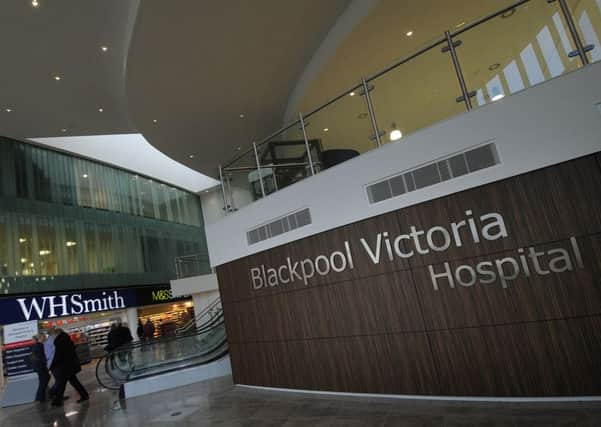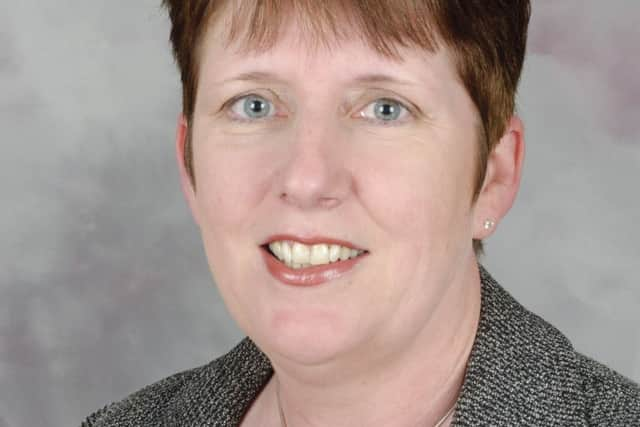Winter crisis fears as hospital waiting times rise


A backlog of fit-again patients unable to be sent home is being blamed for hospital trusts up and down the country missing key A&E waiting times targets.
In October, the latest month for which data has been published, more than 1,300 patients waited more than four hours to be admitted, transferred or discharged at Blackpool Victoria Hospital – an increase of 600 compared to September.
Advertisement
Hide AdAdvertisement
Hide AdJust 82 per cent of people were dealt with inside the four-hour benchmark. The national average for major A&E departments was 89 per cent.


Across Blackpool Teaching Hospitals NHS Trust, which runs the Vic as well as a number of smaller facilities including walk-in centres, 92 per cent of patients were seen within the time limit. It was the first time in months the Trust missed the 95 per cent Government target.
Experts say social services and other agencies are often too over-stretched and under-funded to accept patients who have been treated and are waiting to be transferred.
New figures show the situation has got worse in recent weeks and last month the Fylde coast came close to running out of hospital beds.
Advertisement
Hide AdAdvertisement
Hide AdShadow public health minister Andrew Gwynne said: “These figures show an NHS under deep pressure with hospitals facing unprecedented levels of demand.
“The uncomfortable truth for Tory ministers is that this is a crisis of their own making. Social care has been cut back, and too many older people are being forced to turn to A&E as they aren’t being supported in their homes.
“To make matters worse the NHS has been given less than half the amount of money this year to deal with winter pressures than it had last year.”
Bosses at Blackpool Teaching Hospitals NHS Foundation Trust said A&E attendances were up 3.6 per cent in October, compared to last year.
Advertisement
Hide AdAdvertisement
Hide AdDirector of operations, Pat Oliver, said: “Our staff are working exceptionally hard to give the best possible service to all our patients and ensure safe and effective care for everyone.
“Winter is when the pressure is at its worst on all A&E departments and we are urging people to think about whether their ailment warrants emergency treatment.
“Every minute an A&E doctor spends treating very minor problems reduces the time they can spend attending to those who have suffered heart attacks, strokes or life-threatening injuries.”
Blackpool South MP Gordon Marsden said the hospital is particularly badly affected by the ‘on-going crisis in adult social care’.
Advertisement
Hide AdAdvertisement
Hide AdHe added: “It’s very rich of the Government to constantly point the finger at hospital trusts when the Government itself is responsible for some of the issues.”
He said issues in Blackpool – including the transient population and high numbers of elderly and isolated residents – mean the problem is felt more acutely in the resort.
While A&E waiting times on the Fylde coast in October were in line with the national average, they are worse than the same time last year.
The Trust as a whole comfortably hit the 95 per cent target in every week of October 2014.
Advertisement
Hide AdAdvertisement
Hide AdPatients at the Vic, which contributes to the overall figure but is not directly covered by the 95 per cent target, were consistently seen in under four hours more than 90 per cent of the time.
Bosses are now urging patients only to visit A&E if it is absolutely necessary.
The Royal College of Nursing (RCN) and Nuffield Trust both blamed cuts to social services for a rise in hospital patients, often elderly, unable to leave due to a lack of care workers.
There were 581 delayed days due to issues with transfer of care on the Fylde coast in October. In 377 cases the delay was attributed to the NHS, compared to 141 that were down to social services.
Advertisement
Hide AdAdvertisement
Hide AdRegional director for RCN North West, Estephanie Dunn, said: “Hospitals and A&E departments in many parts of the North West are running at full capacity, with over stretched nurses trying to meet ever-increasing demand without the number of staff they need.
“Hospitals are full-to-bursting, as older patients can’t be discharged because social care packages simply aren’t available to provide the care they need at home.”
Nigel Edwards, Nuffield Trust chief executive, said the delayed transfer of care was rising nationally.
He added: “These bald statistics represent many thousands of patients, often frail and elderly, who have finished their medical treatment but can’t leave hospital because there isn’t enough support for them to go back to their own homes, or even to care homes.
Advertisement
Hide AdAdvertisement
Hide Ad“That’s not surprising when £1.7bn has been cut from local councils’ social care budgets since 2010, meaning that Social Services departments are able to offer this kind of vital help to fewer and fewer people leaving hospital.”
A report published by the Royal College of Emergency Medicine shows trusts have been falling further short of the 95 per cent target in recent weeks but efforts to curb cases of delayed transfer of care are working.
The report states: “Despite the significant efforts made by trusts to improve performance through winter planning, the system as a whole has struggled to maintain performance against a backdrop of rising demand.”